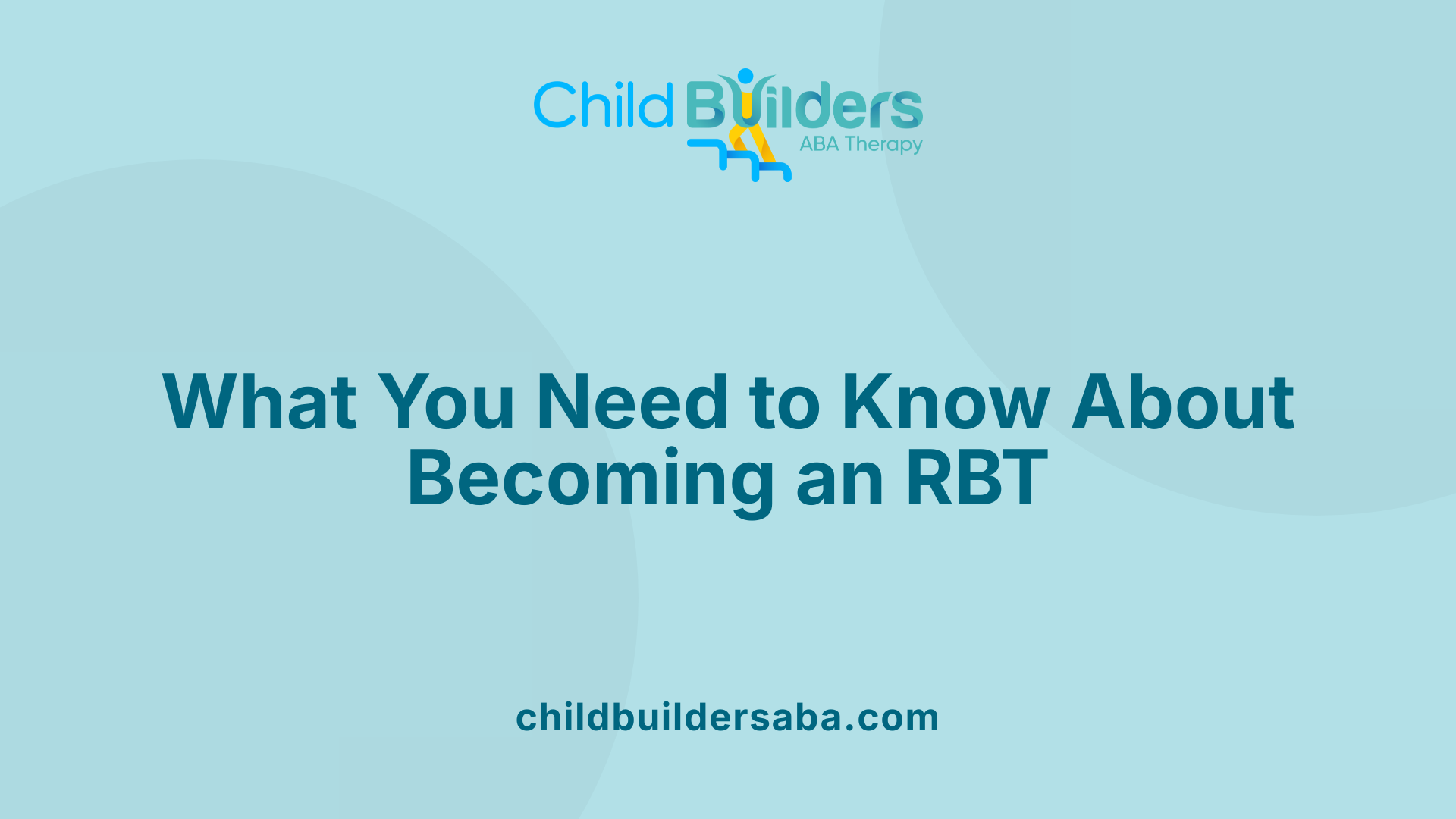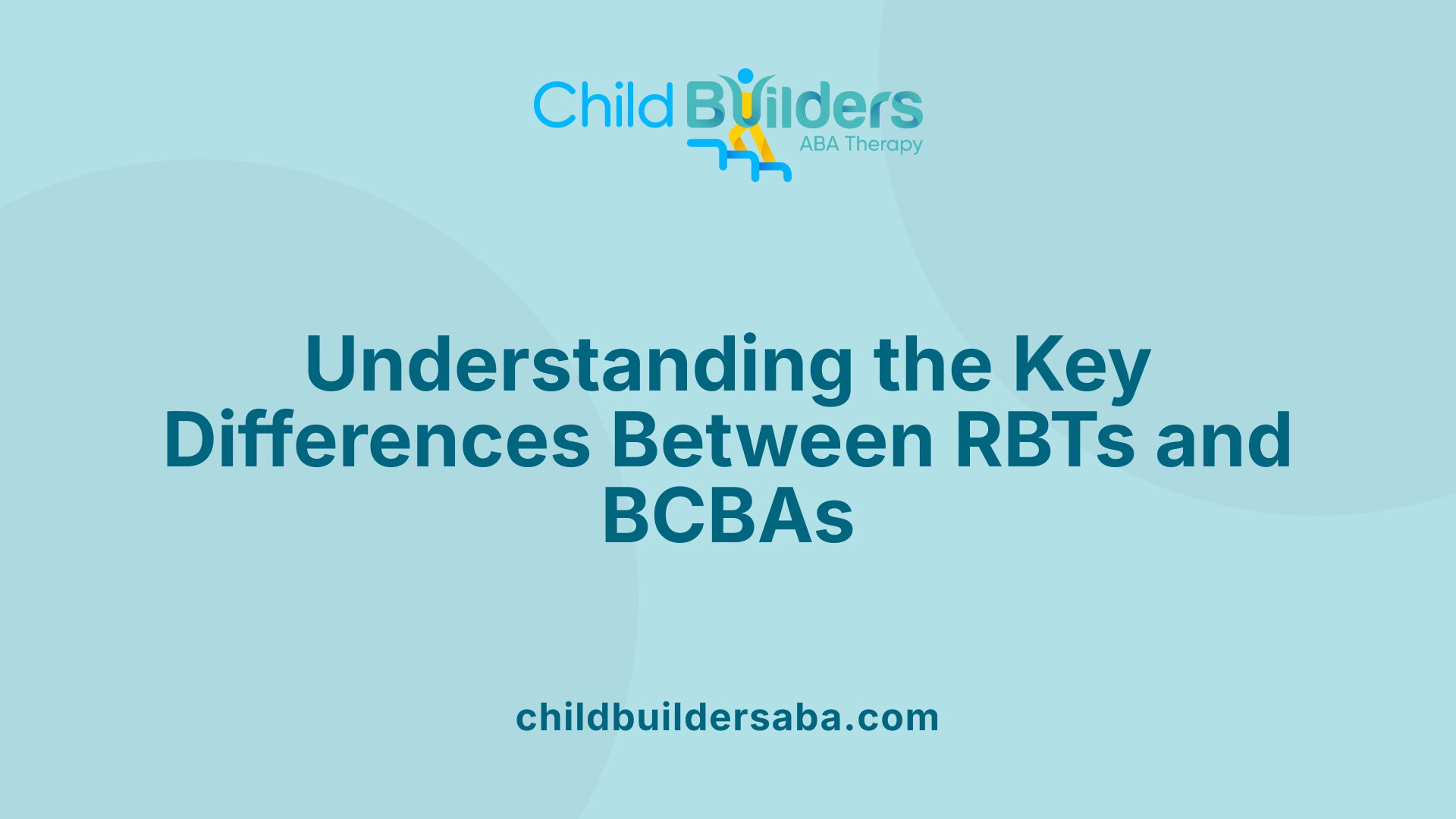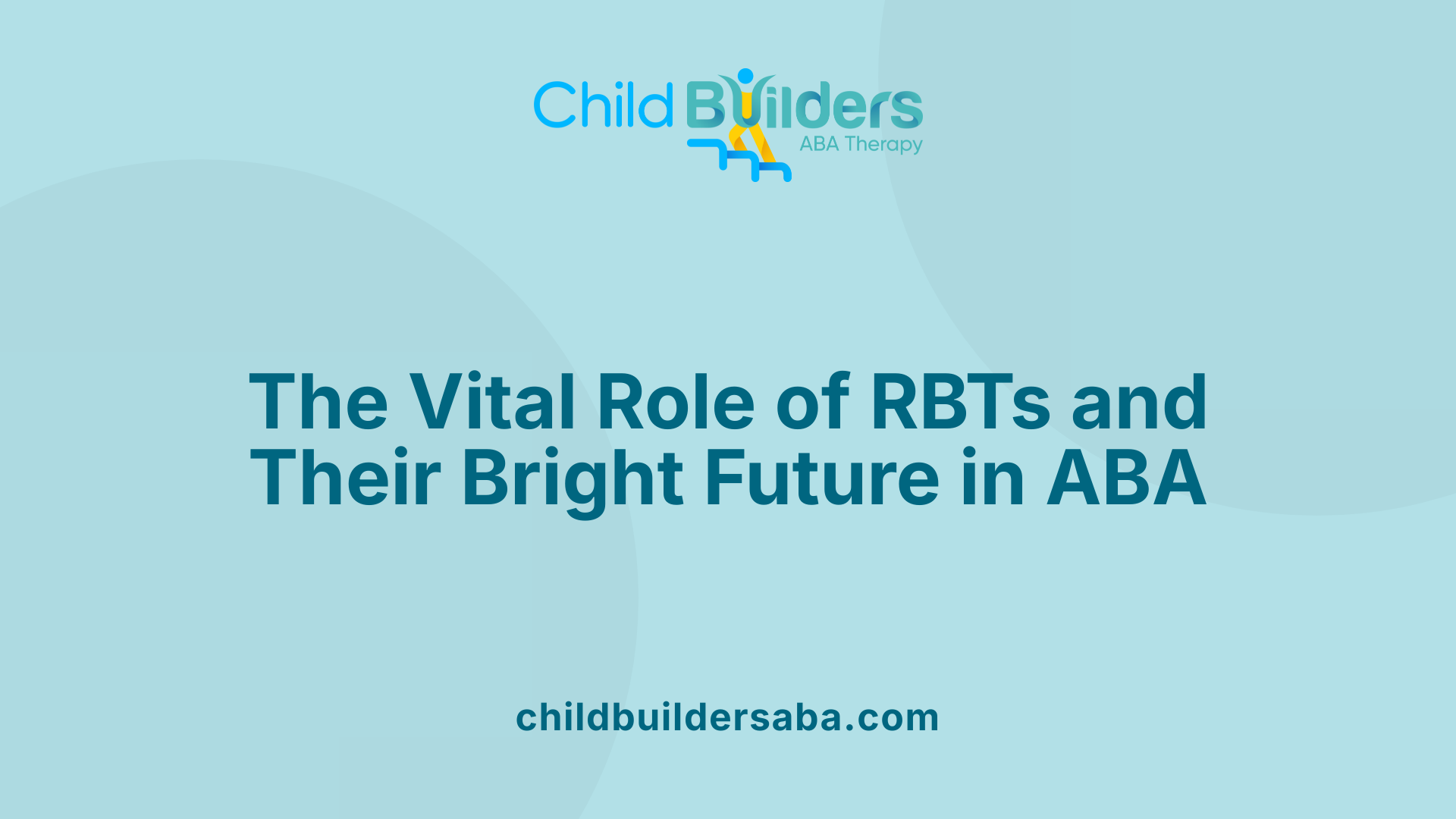What is an RBT?

Introduction to RBTs and Their Importance in Behavioral Health
In recent years, the field of applied behavior analysis (ABA) has gained significant recognition for its effectiveness in supporting individuals with autism spectrum disorder (ASD). Central to this therapeutic approach are the Registered Behavior Technicians (RBTs), paraprofessionals who deliver essential behavioral interventions. This article provides a comprehensive overview of what an RBT is, their responsibilities, certification pathways, and the critical role they play in behavioral therapy.
Defining an RBT and Its Certification

What is an RBT (Registered Behavior Technician)?
A Registered Behavior Technician (RBT) is a paraprofessional trained in behavior analysis who works directly with clients, especially children with autism spectrum disorder (ASD). RBTs support the delivery of applied behavior analysis (ABA) services by implementing treatment plans, collecting data, and assisting in behavioral interventions. They work under the close supervision of a Board Certified Behavior Analyst (BCBA) or another qualified supervisor.
To become an RBT, individuals need to meet several requirements. These include being at least 18 years old, possessing a high school diploma or equivalent, passing a criminal background check, and completing a 40-hour training program approved by the Behavior Analyst Certification Board (BACB). After training, candidates must pass a competency assessment conducted by a qualified supervisor. Following successful completion, they are eligible to take the RBT certification exam.
Once certified, RBTs play a vital role in helping clients develop communication, social skills, and independence. They use evidence-based techniques such as positive reinforcement, natural environment teaching (NET), and chaining to support behavioral growth. RBTs are responsible for tasks like measuring behaviors, implementing interventions, and recording progress.
Maintaining the RBT credential requires ongoing supervision and annual renewal, which involves demonstrating continued competence and adherence to ethical standards. This credential offers a fast pathway into a rewarding career in behavioral health and special education, with opportunities for advancement and specialization.
Roles and Responsibilities in Behavioral Therapy
What are the responsibilities and roles of an RBT in behavioral therapy?
An RBT, or Registered Behavior Technician, plays a vital role in delivering behavioral services under the supervision of a Board Certified Behavior Analyst (BCBA). Their primary responsibility is to implement behavioral intervention plans designed by their supervisors. These plans aim to improve communication, social skills, and daily living abilities, especially in children with autism spectrum disorder.
RBTs work closely with clients in various environments such as homes, schools, and community settings. They help teach new skills, reinforce positive behaviors, and assist in reducing challenging behaviors. Data collection is a crucial part of their work. RBTs record detailed information about client behaviors, progress, and responses to interventions, which helps inform ongoing treatment adjustments.
Supporting families and caregivers is also a core task. RBTs often train family members on how to carry out behavior strategies consistently. They establish rapport with clients to foster a positive therapeutic environment. Their work is guided by ethical principles and maintained through ongoing supervision, continuing education, and adherence to BACB standards.
Overall, RBTs are essential in translating treatment plans into practical, daily interventions that promote meaningful progress for individuals with behavioral challenges.
Certification Pathway and Educational Requirements
What are the certification requirements and process to become an RBT?
Becoming a Registered Behavior Technician (RBT) involves a clear set of eligibility criteria and steps. First, applicants must be at least 18 years old and hold a high school diploma or equivalent. They must pass a criminal background check and complete a 40-hour training program aligned with the RBT Task List within 180 days.
The training covers essential topics such as the fundamentals of Applied Behavior Analysis (ABA), ethical considerations, data collection, and methods to teach skills or reduce problematic behaviors. After finishing the training, candidates must undergo a competency assessment, which is supervised by a BACB-certified professional.
The application process includes creating an account with the Behavior Analyst Certification Board (BACB), submitting all required documents, paying applicable fees, and applying online. Once approved, candidates need to pass a certification exam administered by Pearson VUE, consisting of 85 multiple-choice questions.
Maintaining certification requires ongoing supervision, a renewal process every year, and adherence to ethical guidelines. This includes completing a renewal competency assessment and documenting supervision hours.
What education and training are needed to qualify as an RBT?
The basic educational requirement is a high school diploma or its equivalent. Training involves a 40-hour program delivered by a BACB-certified trainer, focusing on ABA principles, ethical standards, data collection techniques, and skill development strategies.
The training also emphasizes ethical responsibilities, with at least three hours dedicated to the RBT Ethics Code and one hour to supervision. It must be completed within six months (180 days). Post-training, candidates must demonstrate skills and knowledge through a competency assessment.
The final step involves passing the RBT certification exam. This test assesses understanding of ABA concepts, ethical practice, and practical skills necessary for effective service delivery.
| Step | Requirement | Details | Additional Notes |
|---|---|---|---|
| Eligibility | Age & Education | Must be at least 18 with a high school diploma or GED | Ensures maturity and basic education |
| Training | 40-hour Program | Delivered by a BACB-certified trainer covering ABA fundamentals | Mandatory before assessment |
| Competency | Skills Demonstration | Supervised by a qualified professional | Verifies practical understanding |
| Examination | Certification Exam | 85-question multiple-choice test through Pearson VUE | Confirms theoretical knowledge |
| Maintenance | Annual Renewal | Supervision, ethics adherence, and competency renewal needed | Keeps certification valid |
Most candidates also pursue related fields such as education or health sciences, enhancing their skills and career prospects in behavioral health.
For further details, prospective RBTs can search 'How do you become an RBT?' and access additional resources from the BACB.
Distinguishing RBTs from Related Roles

How does an RBT differ from related roles such as a BCBA?
An RBT (Registered Behavior Technician) serves as a paraprofessional dedicated to delivering direct behavioral interventions, mainly working under the supervision of a more advanced professional like a BCBA (Board Certified Behavior Analyst). While both roles are integral to applied behavioral analysis (ABA), their responsibilities and qualifications differ significantly.
Unlike BCBAs, who are licensed professionals with graduate degrees responsible for assessing clients, creating treatment plans, and overseeing therapy sessions, RBTs focus primarily on implementing established treatment strategies. They assist in executing behavior intervention plans, collecting data, and supporting clients—especially children with autism spectrum disorder (ASD)—to develop communication, social, and daily living skills.
The educational background of RBTs is less extensive—they typically hold a high school diploma or GED and complete a 40-hour training course from a certified provider. Certification is obtained through passing an exam administered by the Behavior Analyst Certification Board (BACB) after completing a competency assessment supervised by a BCBA.
In contrast, BCBAs have advanced degrees such as a master's or doctorate, possess a license to practice, and undertake responsibilities like conducting assessments, designing and supervising intervention plans, and overseeing RBT work. Their broader clinical authority allows them to make clinical judgments and evaluate treatment efficacy.
This delineation ensures that RBTs act as frontline staff executing interventions with fidelity, while BCBAs provide higher-level supervision, treatment development, and quality assurance.
| Role | Typical Responsibilities | Educational Requirements | Certification Process | Supervision Level |
|---|---|---|---|---|
| RBT | Implementing behavioral interventions, data collection, assisting clients | High school diploma or GED, 40-hour training, competency assessment | Passing BACB exam after training | Supervised by BCBA |
| BCBA | Designing treatment plans, conducting assessments, supervising RBTs, overseeing client progress | Master's or higher degree, professional licensure | Certification from BACB, ongoing education | Autonomous with clinical oversight |
Understanding these distinctions helps clarify the complementary nature of the RBT and BCBA roles within the ABA framework, ensuring targeted and effective intervention for individuals with behavioral challenges.
Supportive Role and Impact on Clients

What support and services do RBTs provide, especially for children with autism?
Registered Behavior Technicians (RBTs) deliver crucial support within the framework of Applied Behavior Analysis (ABA) therapy, focusing on children with autism spectrum disorder (ASD). They are responsible for implementing individualized behavior intervention plans designed by Board Certified Behavior Analysts (BCBAs).
Through specific strategies like positive reinforcement, natural environment teaching, and chaining, RBTs help children develop essential skills such as communication, social interaction, and independence. Their role includes establishing rapport with clients, introducing appropriate learning opportunities, and meticulously collecting data to monitor progress.
Data collection is vital as it informs necessary adjustments to treatment plans, ensuring each child's unique needs are addressed effectively. RBTs also work closely with families, guiding them on behavioral techniques and strategies to support their child's development at home and in various settings.
By consistently implementing therapeutic strategies and supporting progress, RBTs significantly contribute to helping children with autism reduce problematic behaviors, acquire new skills, and reach developmental milestones. Their dedicated support fosters increased independence and enhances quality of life for both children and their families.
Career Advancement and Opportunities

What are the career opportunities and pathways for RBTs?
Registered Behavior Technicians (RBTs) have a variety of options to further their careers within the field of behavior analysis and beyond. One common pathway involves obtaining additional certifications such as the Board Certified Assistant Behavior Analyst (BCaBA) and the Board Certified Behavior Analyst (BCBA). These higher-level credentials require further education, supervised practical experience, and passing rigorous exams.
Many RBTs leverage their foundational training to pursue higher education in psychology, education, or related health disciplines. This educational pursuit allows them to take on more advanced roles, including developing treatment plans or supervising other staff. RBTs often move into leadership positions within clinics, schools, or select private practices.
The role of an RBT serves as a crucial entry point into the broader ABA field. With experience, RBTs can specialize in areas such as social skills training, communication development, or behavior reduction. The increasing demand for ABA services, particularly for children with autism spectrum disorder (ASD), fuels ongoing employment opportunities across homes, schools, clinics, and community programs.
Overall, the profession offers a clear pathway for career advancement, higher earning potential, and expanded responsibilities through continued education and certifications.
What is the certification renewal process and its significance?
Maintaining an active RBT credential involves an annual renewal process. RBTs must demonstrate their ongoing competence by completing supervision requirements, continuing education (CE), and submitting necessary documentation before their certification expires.
The renewal process includes submitting supervision logs, CE certificates, and paying a renewal fee, generally around $35. It typically must be completed at least 30 days prior to the expiration date to ensure uninterrupted certification.
Renewing certification is significant because it ensures RBTs stay current with evolving ethical standards, clinical practices, and regulatory updates provided by the Behavior Analyst Certification Board (BACB). It reflects a professional commitment to ethical practice and continuous learning.
The two-year renewal period encourages ongoing professional development and helps uphold high standards of client care and service quality. Failure to renew can result in a lapse in certification, limiting employment opportunities and the ability to work legally in the field.
How do RBTs advance their careers?
RBTs seeking to grow professionally should consider pursuing higher-level credentials like the BCaBA and BCBA for increased responsibilities and higher earning potential. Gaining additional certification often involves further coursework, supervised experience, and passing higher-level exams.
In addition to certifications, acquiring a related degree or specialization in areas such as special education, speech therapy, occupational therapy, or mental health can broaden career opportunities.
Many professionals also expand their roles by working in interdisciplinary teams, training caregivers, or taking on supervisory responsibilities. The COVID-19 pandemic has increased demand for behavioral health services, creating more opportunities for RBTs to enter specialized or leadership roles.
In summary, the pathway for RBTs to advance includes continuous education, certification, and gaining experience, all contributing to a fulfilling career in behavioral health.
| Aspect | Details | Significance |
|---|---|---|
| Further Certifications | BCaBA, BCBA | Higher responsibilities & earnings |
| Education & Specialization | Psychology, Education, Speech, or Occupational Therapy | Broader career options |
| Growth in Demand | Autism services, educational settings, healthcare | Increased job opportunities |
| Renewal Process | Supervision, CE, documentation | Ensures competence & certification validity |
Conclusion and Final Thoughts

What is the role and purpose of an RBT within applied behavior analysis (ABA) therapy?
An RBT (Registered Behavior Technician) is a paraprofessional certified by the BACB who plays a critical role in delivering applied behavior analysis (ABA) therapy under the supervision of a Board Certified Behavior Analyst (BCBA). Their primary purpose is to implement individualized behavior intervention plans, using strategies such as positive reinforcement and natural environment teaching to help clients develop communication, social, and daily living skills while reducing problematic behaviors.
RBTs are responsible for collecting and recording data on client progress, which informs necessary program adjustments and ensures effective treatment outcomes. They also build rapport with clients and collaborate with families and professionals to create supportive environments conducive to learning and behavior change.
Ultimately, RBTs serve as the frontline practitioners who facilitate the practical application of ABA techniques to improve the quality of life for individuals with autism spectrum disorder and other developmental disabilities.
Final remarks on the significance of RBTs and career prospects
The role of RBTs is vital in expanding access to effective behavioral interventions for individuals with autism and other developmental disabilities. Their work not only supports skill development and behavior reduction but also provides essential support to families and caregivers navigating behavioral challenges.
As the demand for ABA therapy continues to grow, so do the career opportunities for motivated individuals seeking to enter the field. With proper certification and ongoing professional development, RBTs can find a rewarding and impactful career path that offers personal fulfillment, growth potential, and the chance to make a meaningful difference in clients’ lives.
More about the future of RBTs and ABA training programs:
The field of ABA is expected to see increasing integration of online training platforms and expanded certification options, making entry easier and more accessible. As awareness and acceptance of ABA therapy grow worldwide, the demand for qualified RBTs will likely continue to rise, encouraging more educational providers to offer comprehensive training programs geared toward program development, ethical practices, and advanced skills. This evolution promises a promising outlook for current and prospective RBTs seeking meaningful work in behavioral health.
Final Thoughts on the Role and Future of RBTs
Registered Behavior Technicians play an indispensable role in the delivery of applied behavior analysis therapy, especially in supporting children with autism spectrum disorder. Their responsibilities encompass executing treatment plans, collecting vital data, and fostering client progress under the supervision of licensed behavior analysts. As the field of ABA experiences increasing demand, the pathway to becoming an RBT is accessible, requiring foundational education, specific training, and certification. The ongoing needs for behavioral health support present promising career opportunities and pathways for advancement, including further certification and specialization. For individuals passionate about making a tangible difference in people’s lives, becoming an RBT offers a fulfilling and impactful professional journey. As awareness and therapeutic interventions expand, RBTs will continue to be key players in fostering positive outcomes and improving quality of life for many clients and families.
References
- Registered Behavior Technician (RBT) - BACB
- How to Become a Registered Behavior Technician (RBT)
- RBT vs. BCBA Career Paths - School of Education - Drexel University
- What is a Registered Behavior Technician?
- What is an RBT? The Role of the Registered Behavior Technician in ...
- What Is the Difference Between BCBA and RBT?
- How to Become a Registered Behavior Technician (RBT) in Texas





































































































